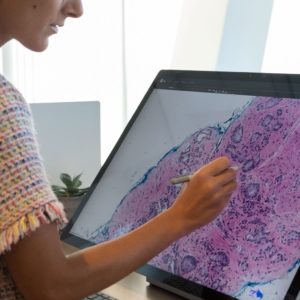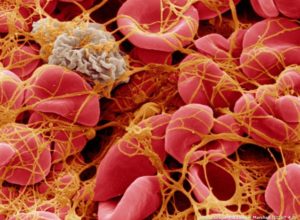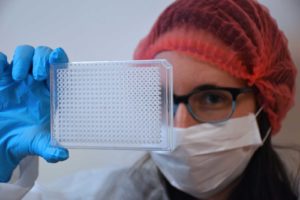A prostate cancer detection software system to help pathologists quickly identify suspicious areas of tissue, developed by the digital diagnostic company Paige, will be investigated in a multicentre clinical study led by the University of Oxford as part of a successful NHSX Artificial Intelligence ... READ MORE
News for Molecular Diagnostics
Artificial intelligence tool for streamlining pathology workflow
A multidisciplinary team comprising University of Oxford academics and Oxford University Hospitals (OUH) pathologists has developed an algorithm that automates requests for additional investigation of diagnostically uncertain prostate biopsies. The team were supported by the NIHR Oxford BRC ... READ MORE
Eight BRC projects get RCF funding
Eight Oxford BRC proposals, many covering a number of themes, have been awarded NIHR Research Capability Funding (RCF) funding to take forward key areas of research. The selected projects that will be supported include: Developing a research centre devoted to urgent and acute careThe ... READ MORE
Test developed to identify new-borns at risk of leukaemia
Oxford researchers have developed a new method to quickly identify cancerous cells in babies at risk of leukaemia. The team hope that the new protocol could make rapid testing more accessible for clinical laboratories around the globe. Until now, the only reliable way to know if a baby with ... READ MORE
BRC researchers’ work recognised with Vice-Chancellor’s Awards
A number of Oxford BRC-supported researchers have been recognised in this year’s University of Oxford Vice-Chancellor Innovation Awards. The Vice-Chancellor Innovation Awards celebrate research-led innovation that is having societal or economic impact. Prof Robert MacLaren, who leads the BRC’s ... READ MORE
Home colorectal cancer tests could prioritise patients for referral
Non-invasive home-based tests that detect blood in patient stool samples offer an accurate and appropriate triaging method for GPs, according to University of Oxford researchers. The study, which is already informing a redesign of the colorectal cancer pathway at Oxford University Hospitals (OUH) ... READ MORE
Molecular Diagnostics theme hosts cancer genomics and immunology seminar
The Molecular Diagnostics theme hosted a very successful seminar, ‘Advanced personalised therapies in gynaecological cancers’, at St Hugh’s College in February 2020. The meeting covered the genomics and immunology of cancer along with the emerging topic of advanced therapeutic medicinal products ... READ MORE
Study discovers genetic changes linked to leukaemia in children with Down’s syndrome
Researchers at the University of Oxford have discovered the specific gene mutations that are required for the development of leukaemia in children with Down’s syndrome. Children with Down’s syndrome have a 150-fold increased risk of myeloid leukaemia, and while some of the genetic causes of ... READ MORE
Summary of the Crohn’s & Colitis Open Evening
On Thursday 7th February 2019, over 170 members of the public affected by Crohn’s Disease or Ulcerative Colitis attended a ‘Crohn’s and Colitis Open Evening’ at the John Radcliffe Hospital, Oxford. Below is a PDF summary of the event plus a slideshow with slides from the Powerpoint presentation ... READ MORE
Oxford researchers develop new technique to analyse cancer cells’ life history
A team of researchers from the University of Oxford has developed a new technique that allows scientists to reliably track genetic errors in individual cancer cells, and find out how these might lead to uncontrollable growth. The research by the MRC Weatherall Institute of Molecular Medicine, ... READ MORE
MDS Patient Support Group learn more about treatment of condition
Patients and relatives affected by Myelodysplastic Syndromes (MDS) have visited the MRC Weatherall Institute of Molecular Medicine (WIMM) at the John Radcliffe Hospital to find out more about advances in treating the condition. The members of the Oxford and Thames Valley MDS Patient Support Group ... READ MORE








